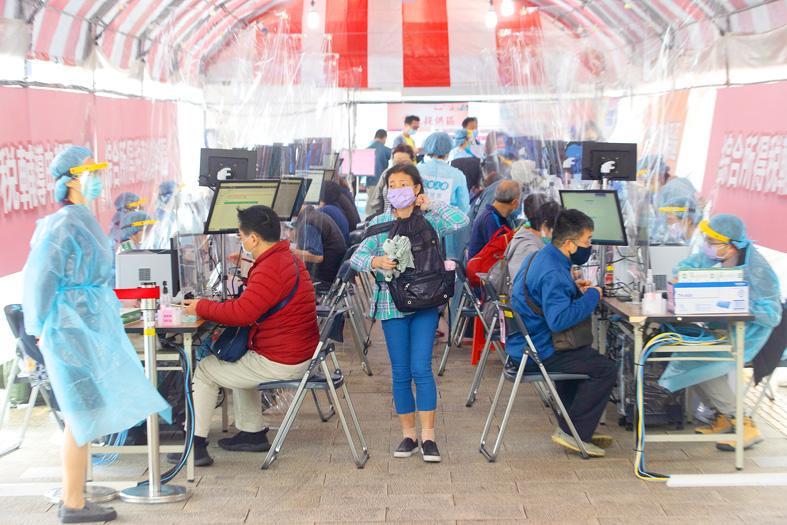The basic living expense tax deduction is to be raised by NT$4,000 to NT$196,000, benefiting an estimated 2.3 million households, the Executive Yuan said yesterday.
Following the adjustment, a family of four with a 12 percent tax rate would save up to NT$1,920 in taxes per year, while single taxpayers who earn less than NT$540,000 a year could save NT$200, the Directorate-General of Budget, Accounting and Statistics (DGBAS) said in a report last month.
The proposal was made by the Ministry of Labor at a Cabinet meeting yesterday, and would go into effect ahead of next year’s tax due date in May.

Photo: CNA
It would be the sixth consecutive year that the basic living expense deduction has been increased.
Last year saw the biggest increase in the nation’s history, when it was increased by NT$10,000 to NT$192,000.
Under the Taxpayer Rights Protection Act (納稅者權利保護法), individuals should not be taxed on the amount they need to cover basic expenses, which is defined as 60 percent of the median disposable income per capita from the preceding year.
Based on last year’s median disposable income of NT$326,000 — an increase of NT$6,000 from 2020 — the basic living expense deduction would be NT$196,000, the DGBAS said last month.
The deduction update came after the Cabinet on Wednesday approved a minimum wage increase, Executive Yuan spokesperson Lo Ping-cheng (羅秉成) said yesterday.
Starting from Jan. 1, the basic wage is to increase from NT$25,250 to NT$26,400 for monthly earners, or from NT$168 to NT$176 hourly, benefitting 2.32 million people, he said.
It is the seventh consecutive year that the minimum wage has been raised under President Tsai Ing-wen (蔡英文), Lo said.
In that time, the monthly minimum wage has increased 31.9 percent while the hourly minimum wage has risen 46.7 percent, showing the administration’s determination to support the working class, he said.
It is not easy to reach a consensus on wage increases, Premier Su Tseng-chang (蘇貞昌) said, thanking employers and employees for coming together on the issue, and the government for listening to the needs of both sides.
A wage hike offers crucial support to young people entering the workforce and disadvantaged members of society, he said, urging the ministries of economic affairs and labor to work quickly to develop a set of accompanying measures for businesses to cope with the increased wages.
Regarding a new version of the scrapped Minimum Wage Act (最低工資法), Lo said that the Cabinet is still deliberating its draft.
However, even without a dedicated law, there is still a mechanism for increasing the minimum wage, as evidenced by the past seven years of raises, he added.
Additional reporting by CNA

Tropical Storm Gaemi strengthened into a typhoon at 2pm yesterday, and could make landfall in Yilan County tomorrow, the Central Weather Administration (CWA) said yesterday. The agency was scheduled to issue a sea warning at 11:30pm yesterday, and could issue a land warning later today. Gaemi was moving north-northwest at 4kph, carrying maximum sustained winds near its center of up to 118.8kph and gusts of 154.8kph. The circumference is forecast to reach eastern Taiwan tomorrow morning, with the center making landfall in Yilan County later that night before departing from the north coast, CWA weather forecaster Kuan Shin-ping (官欣平) said yesterday. Uncertainty remains and

SEA WARNING LIKELY: The storm, named Gaemi, could become a moderate typhoon on Wednesday or Thursday, with the Taipei City Government preparing for flooding A tropical depression east of the Philippines developed into a tropical storm named Gaemi at 2pm yesterday, and was moving toward eastern Taiwan, the Central Weather Administration (CWA) said. Gaemi could begin to affect Taiwan proper on Tuesday, lasting until Friday, and could develop into a moderate typhoon on Wednesday or Thursday, it said. A sea warning for Gaemi could be issued as early as Tuesday morning, it added. Gaemi, the third tropical storm in the Pacific Ocean this typhoon season, is projected to begin moving northwest today, and be closest to Taiwan on Wednesday or Thursday, the agency said. Today, there would likely

DISRUPTIONS: The high-speed rail is to operate as normal, while several airlines either canceled flights or announced early departures or late arrivals Schools and offices in 15 cities and counties are to be closed today due to Typhoon Gaemi, local governments announced last night. The 15 are: Taipei, New Taipei City, Taoyuan, Tainan, Keelung, Hsinchu and Kaohsiung, as well as Yilan, Hualien, Hsinchu, Miaoli, Chiayi, Pingtung, Penghu and Lienchiang counties. People should brace for torrential rainfall brought by the storm, with its center forecast to make landfall on the east coast between tonight and tomorrow morning, the Central Weather Administration (CWA) said. The agency issued a sea warning for the typhoon at 11:30pm on Monday, followed by a land warning at 11:30am yesterday. As of

CASUALTY: A 70-year-old woman was killed by a falling tree in Kaohsiung as the premier warned all government agencies to remain on high alert for the next 24 hours Schools and offices nationwide are to be closed for a second day today as Typhoon Gaemi crosses over the nation, bringing torrential rain and whipping winds. Gaemi was forecast to make landfall late last night. From Tuesday night, its outer band brought substantial rainfall and strong winds to the nation. As of 6:15pm last night, the typhoon’s center was 20km southeast of Hualien County, Central Weather Administration (CWA) data showed. It was moving at 19kph and had a radius of 250km. As of 3pm yesterday, one woman had died, while 58 people were injured, the Central Emergency Operation Center said. The 70-year-old